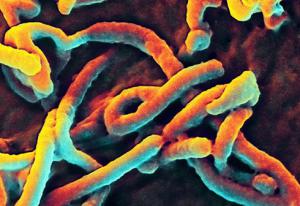EbolaEbola no longer a “Public Health Emergency of International Concern”: WHO
On Tuesday the WHO officials met to consider the Ebola virus disease (EVD) outbreak in West Africa, and to decide whether the event continues to constitute a Public Health Emergency of International Concern (PHEIC) and whether the current Temporary Recommendations should be extended, rescinded, or revised. WHOconcluded that Ebola transmission in West Africa no longer constitutes an extraordinary event, that the risk of international spread is now low, and that countries currently have the capacity to respond rapidly to new virus emergences. Accordingly, the Ebola situation in West Africa no longer constitutes a Public Health Emergency of International Concern, and the temporary recommendations adopted in response should now be terminated.

Scanning electro micrograph of ebola viruses budding // Source: commons.wikimedia.org
On Tuesday, 29 March 2016, the 9th meeting of the Emergency Committee convened by the WHO Director-General under the International Health Regulations (2005) (IHR) regarding the Ebola virus disease (EVD) outbreak in West Africa.
WHO says that the Committee was requested to provide the Director-General with views and perspectives as to whether the event continues to constitute a Public Health Emergency of International Concern (PHEIC) and whether the current Temporary Recommendations should be extended, rescinded, or revised.
Representatives of Guinea, Liberia, and Sierra Leone presented the epidemiological situation, ongoing work to prevent Ebola re-emergence, and capacity to detect and respond rapidly to any new clusters of cases in each country.
The Committee noted that since its last meeting all three countries have met the criteria for confirming interruption of their original chains of Ebola virus transmission. Specifically, all three countries have now completed the forty-two day observation period and additional ninety day enhanced surveillance period since their last case that was linked to the original chain of transmission twice tested negative. Guinea achieved this milestone on 27 March 2016.
The Committee observed that, as expected, new clusters of Ebola cases continue to occur due to reintroductions of virus as it is cleared from the survivor population, though at decreasing frequency. Twelve such clusters have been detected to date, the most recent of which was reported on 17 March 2016 in Guinea and is ongoing. The Committee said it was impressed that to date all of these clusters have been detected and responded to rapidly, limiting transmission to at most two generations of cases in the eleven clusters which have now been stopped.
The Committee concluded that Ebola transmission in West Africa no longer constitutes an extraordinary event, that the risk of international spread is now low, and that countries currently have the capacity to respond rapidly to new virus emergences. Accordingly, in the Committee’s view, the Ebola situation in West Africa no longer constitutes a Public Health Emergency of International Concern and the Temporary Recommendations adopted in response should now be terminated. The Committee emphasized that there should be no restrictions on travel and trade with Guinea, Liberia, and Sierra Leone, and that any such measures should be lifted immediately.
As in other areas of sub-Saharan Africa where Ebola virus is present in the ecosystem, and recognizing that new clusters due to re-emergence may occur in the coming months, the Committee reinforced that these countries must maintain the capacity and readiness to prevent, detect, and respond to any ongoing or new clusters in future. National and international efforts must be intensified to ensure that male survivors can have their semen tested for virus persistence and know their status. Work must continue on the use of Ebola vaccination for intimate and close contacts of those survivors who have persistent virus excretion. Particularly important will be to ensure that communities can rapidly and fully engage in any future response, cases are quickly isolated and managed, local population movement in the affected areas is managed, and appropriate contact lists are shared with border authorities.
The Committee further emphasized the crucial need for continued international donor and technical support to prevent, detect, and respond rapidly to any new Ebola outbreak in West Africa. International support is required in particular to maintain and, where needed, expand diagnostic laboratory and surveillance capacity, sustain vaccination capacity for outbreak response, and continue relevant research and development activities (for example, on therapeutic options to clear persistent virus excretion). The Committee gave special attention to the need to ensure that sufficient and appropriate clinical care, testing capacity and welfare services are available to all survivors of this extraordinary health crisis.
Based on the advice of the Emergency Committee, and her own assessment of the situation, the Director-General terminated the Public Health Emergency of International Concern (PHEIC) regarding the Ebola virus disease outbreak in West Africa, in accordance with the International Health Regulations (2005). WHO says that the Director-General terminated the Temporary Recommendations that she had issued in relation to this event, supported the public health advice provided above by the Committee, and reinforced the importance of States Parties immediately lifting any restrictions on travel and trade with these countries.
